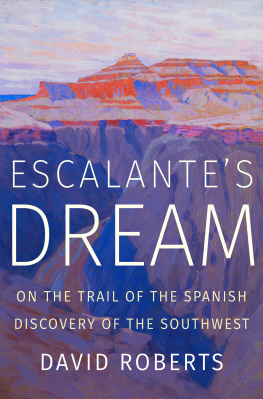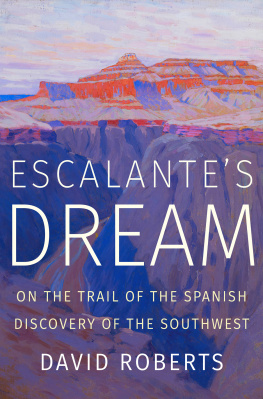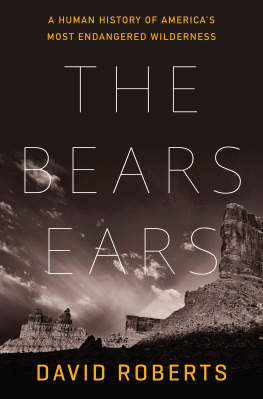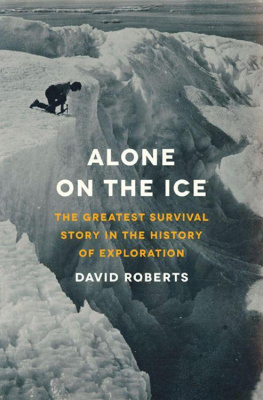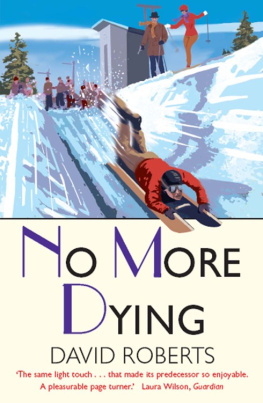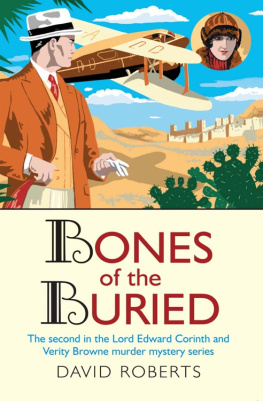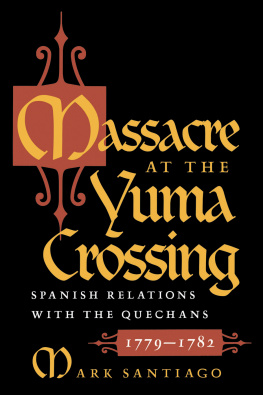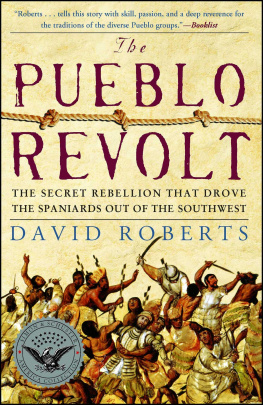Contents
Guide

ALSO BY DAVID ROBERTS
Limits of the Known
Alone on the Wall
(with Alex Honnold)
The Lost World of the Old Ones:
Discoveries in the Ancient Southwest
Alone on the Ice:
The Greatest Survival Story in the History of Exploration
The Mountain:
My Time on Everest (with Ed Viesturs)
The Will to Climb:
Obsession and Commitment and the Quest to Climb Annapurna
(with Ed Viesturs)
Finding Everett Ruess:
The Life and Unsolved Disappearance of a
Legendary Wilderness Explorer
K2: Life and Death on the Worlds Most Dangerous Mountain
(with Ed Viesturs)
The Last of His Kind: The Life and Adventures of Bradford Washburn, Americas Boldest Mountaineer
Devils Gate:
Brigham Young and the Great Mormon Handcart Tragedy
No Shortcuts to the Top:
Climbing the Worlds 14 Highest Peaks
(with Ed Viesturs)
Sandstone Spine:
Seeking the Anasazi on the First Traverse of the Comb Ridge
On the Ridge Between Life and Death:
A Climbing Life Reexamined
The Pueblo Revolt:
The Secret Rebellion That Drove the Spaniards Out of the Southwest
Four Against the Arctic:
Shipwrecked for Six Years at the Top of the World
Escape from Lucania:
An Epic Story of Survival
True Summit:
What Really Happened on the Legendary Ascent of Annapurna
A Newer World:
Kit Carson, John C. Frmont, and the Claiming of the American West
The Lost Explorer:
Finding Mallory on Mount Everest (with Conrad Anker)
Escape Routes
In Search of the Old Ones:
Exploring the Anasazi World of the Southwest
Once They Moved Like the Wind:
Cochise, Geronimo, and the Apache Wars
Mount McKinley:
The Conquest of Denali (with Bradford Washburn)
Iceland:
Land of the Sagas (with Jon Krakauer)
Jean Stafford: A Biography
Great Exploration Hoaxes
Moments of Doubt
Deborah: A Wilderness Narrative
The Mountain of My Fear
ESCALANTES
DREAM
On the Trail of
the Spanish Discovery
of the Southwest
David Roberts

Copyright 2019 by David Roberts
All rights reserved
First Edition
For information about permission to reproduce selections from this book, write to Permissions, W. W. Norton & Company, Inc., 500 Fifth Avenue, New York, NY 10110
For information about special discounts for bulk purchases, please contact W. W. Norton Special Sales at specialsales@wwnorton.com or 800-233-4830
Book design by Lovedog Studio
Production manager: Anna Oler
Library of Congress Cataloging-in-Publication Data
Names: Roberts, David, 1943
Title: Escalantes dream : on the trail of the Spanish discovery of the Southwest / David Roberts.
Description: First edition. | New York : W. W. Norton & Company, 2019. |
Includes bibliographical references and index.
Identifiers: LCCN 2019006079 | ISBN 9780393652062 (hardcover)
Subjects: LCSH: Domnguez-Escalante Expedition (1776) | Roberts, David, 1943 TravelSouthwest, New. | Southwest, NewDescription and travel. | Four Corners RegionDescription and travel. | Southwest, NewDiscovery and explorationSpanish. | Domnguez, Francisco Atanasio, active 1776. | Vlez de Escalante, Silvestre, 1792. | ExplorersSouthwest, NewBiography. | ExplorersSpainBiography. | FranciscansSouthwest, NewBiography.
Classification: LCC F799 . R63 2019 | DDC 979/.01dc23
LC record available at https://lccn.loc.gov/2019006079
ISBN 9780393652079 (ebook)
W. W. Norton & Company, Inc., 500 Fifth Avenue, New York, N.Y. 10110
www.wwnorton.com
W. W. Norton & Company Ltd., 15 Carlisle Street, London W1D 3BS
Contents
For Sharon
Because you are there

Route followed by the DomnguezEscalante expedition, July 29, 1776, to January 2, 1777.
Courtesy of Adam Stack.
T HE R IO G RANDE V ALLEY ALL THE WAY UP TO WHAT IS today north-central New Mexico was a Spanish colony from 1598, as was much of southern Arizona up to the mission at San Xavier del Bac, from 1692. Both regions, of course, are today parts of the American Southwest. In crediting the DomnguezEscalante expedition with the Spanish discovery of the Southwest, as I do in the subtitle to this book and several times in the text, I mean to evoke the greater Southwestthe convoluted and magnificent landscape of deep canyons and towering buttes and alpine mountains ranging from the San Juans to the Wasatch, from Canyonlands to the Grand Canyon, from the lakes of northern Utah to the plains of northern Arizona. It was the Spanish discovery of this vast country, known before 1776 only to the indigenous Native Americans, that the Franciscan padres and their ten companions accomplished.
ESCALANTES DREAM
T HE THREE-QUARTER MOON HAD CREPT INTO THE WEST when my nightmare arrived.
It was September 2, 2017. That morning my wife, Sharon, and I had left Santa Fe on what promised to be a six-week journey, following the fugitive trail of the twelve-man expedition that had passed this way 241 years before. Our voyage was one that would have seemed almost tame to me throughout my adult lifeuntil two years earlier, when cancer had abruptly redefined all my notions of the possible. Now I knew that our forty days in pursuit of Domnguez and Escalante posed as stern a challenge as I dared to engage.
We had driven north on Highway 84, through the crossroads town of Espaola, along the Chama River, arriving after some 45 miles at the sleepy village of Abiquiu, famed for Georgia OKeeffes obsession with cow skulls, local flowers, and the old mission church. From there we had headed south on a dirt road that climbed out of a tight canyon to emerge on a glorious grassy plateauland still held by the descendants of the benefactors of an old Spanish land grant. After some 10 miles we had crossed into the Santa Fe National Forest. Around 5 PM we found the perfect roadside campsite, at 8,000 feet under the soaring ponderosas, with open views east to a far rim of the forest and west to Cerro Pedernal, the volcanic mountain from which the ancients had extracted chert and obsidian to craft their dart points and arrowheads. We set up our tent, gathered sticks for a fire, and sat in our ten-dollar Walmart camp chairs sipping Pilsner Urquells as the sun slipped toward the horizon. I was as happy as I had been in months.
It was Saturday night. The previous evening, an old friend who lives in Santa Fe, on learning about our plans, had warned us that Espaola was the center of opioid and alcohol excess in northern New Mexico. As she wished us well, she parted with that timeless admonition, Be careful.
I was inclined to dismiss our friends malaise, recognizing in it, along with statistical accuracy, an ancient bias against Hispanic lifeways promulgated by the Anglos who ran New Mexico after 1848. But Sharon was troubled. Unable to sleep during our last night in Santa Fe, she got up and Googled Espaolaopioidscrime on her iPhone. I slept on oblivious. In the morning, she haltingly shared her worries. I pointed out that we would pass through Espaola in the afternoon and that wherever we car-camped, it would be well beyond the range of the regions most malevolent junkies.
Since we had set up camp, only a single vehicle had passed by on the dirt road, a pickup headed at dusk, I guessed, for home or some other civilized refuge. But paradoxically, when almost no cars pass your campsite, the advent of a single one, announced by distant engine noise, then by the beams of headlights bouncing among the trees, seems faintly ominous.

